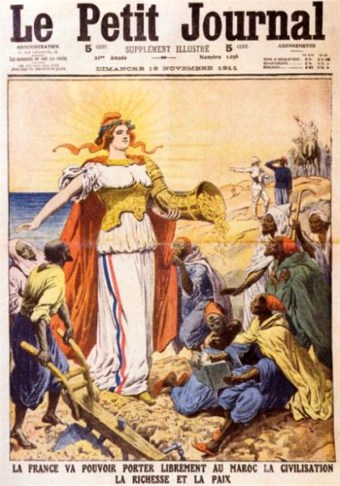Day 14
The Ideal of the Civilizing Mission
Civilization is a particularly French concept;
the French invented the term in the eighteenth century and have
celebrated the achievements of their own ever since. At no point in
modern history, however, did the French make more claims for their
civilization than during the new imperialism of the Third Republic. Of
course all European powers at the end of the nineteenth century claimed
to be carrying out the work of civilization in their overseas
territories; but only in republican France was this claim elevated to
the realm of official imperial doctrine. From about 1870, when France
began to enlarge its holdings in Africa and Indochina, French
publicists, and subsequently politicians, declared that their government
alone among the Western states had a special mission to civilize the
indigenous peoples now coming under its control -- what the French
called their mission civilisatrice.
have
celebrated the achievements of their own ever since. At no point in
modern history, however, did the French make more claims for their
civilization than during the new imperialism of the Third Republic. Of
course all European powers at the end of the nineteenth century claimed
to be carrying out the work of civilization in their overseas
territories; but only in republican France was this claim elevated to
the realm of official imperial doctrine. From about 1870, when France
began to enlarge its holdings in Africa and Indochina, French
publicists, and subsequently politicians, declared that their government
alone among the Western states had a special mission to civilize the
indigenous peoples now coming under its control -- what the French
called their mission civilisatrice.
This idea of a secular mission
civilisatrice did not
originate under the Third Republic; it nevertheless acquired a
particularly strong resonance after the return of democratic
institutions in France, as the new regime struggled to reconcile its
aggressive imperialism with its republican ideals. The notion of a
civilizing mission rested upon certain fundamental assumptions about the
superiority of French culture and the perfectibility of humankind.
It implied that France’s colonial subjects were to primitive to
rule themselves, but were capable of being uplifted.
It intimated that the French were
particularly suited, by temperament and by virtue of both their
revolutionary past and the4ier current industrial strength, to carry out
this task. Last but not
least, it assumed that the Third Republic had a duty and a right to
remake “primitive” cultures along lines inspired by the cultural,
political, and economic development of France.
The ideology of the civilizing mission could not
but strike a responsive chord in a nation now publicly committed to
institutionalizing the universal principles of 1789. At the end of the
nineteenth century, few French citizens doubted that the French were
materially and morally superior to -- and that they lived in greater
freedom than-the rest of the earth's inhabitants. Many may have scoffed
at the idea that the Republic's empire was actually bestowing these
blessings upon those ostensibly still oppressed. But no one questioned
the premise of French superiority upon which the empire rested, or even
that the civilizing mission could in fact be accomplished. Such
convictions were part of what it meant to be French and republican in
this period, and had a profound impact on the way in which the French
ran their colonies. Administrators
-- vastly outnumbered, and equipped with little more than their
prejudices -- relied upon the familiar categories of "civilization" and
its inevitable opposite, "barbarism," to justify and maintain their
hegemony overseas. These
categories served to structure how officials thought about themselves as
rulers and the people whom they ruled, with complex and often
contradictory consequences for French colonial policy -- and French
republican identity --in the twentieth century.